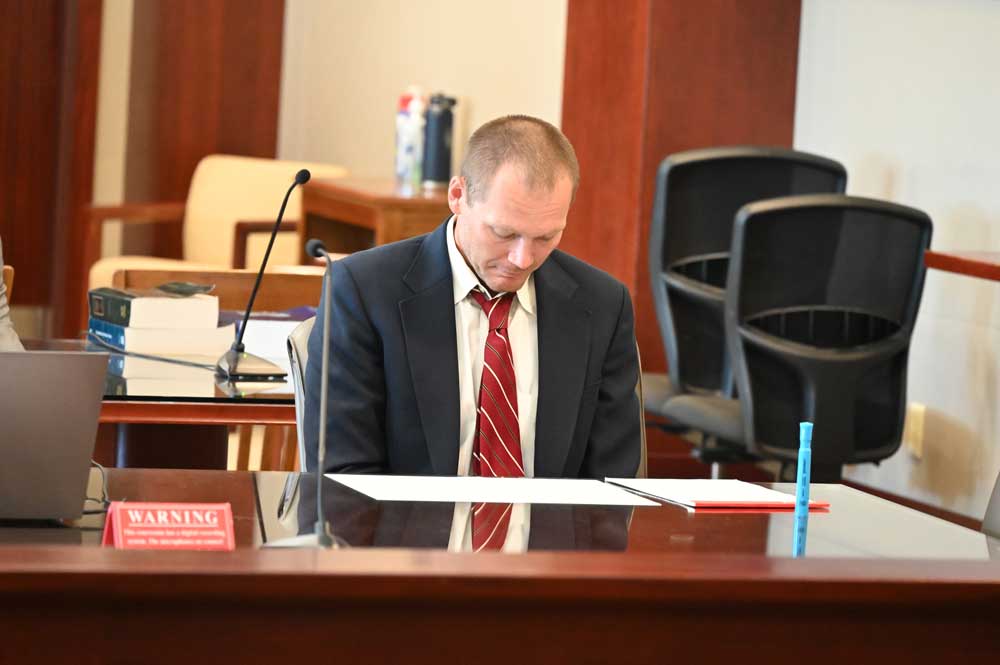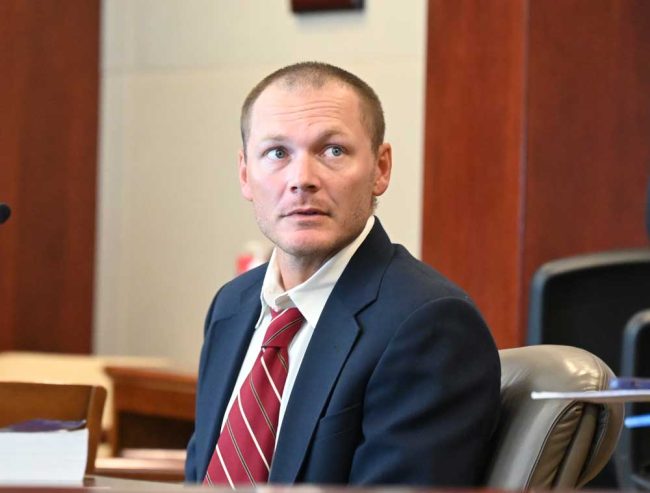
Tyler Jon Habdas, the 31-year-old former Palm Coast resident who’d secretly taken video of his 12-year-old step-daughter in the bathroom over six months, was sentenced to five years in prison and eight years on sex-offender probation today. A jury found him guilty of video voyeurism and other charges in a July trial.
Habdas addressed the court for the first time today, again repeating under cross-examination from the prosecutor that his video recordings were not intended to be prurient, but that he was spying on his step-daughter only because he worried that she might be using a cell phone without permission.
That theory only emerged at trial. Previously, in a 90-minute phone conversation with his ex-wife, which detectives secretly recorded, Habdas continuously denied ever hiding his phone in the bathroom to record the girl and accused the girl of lying/. I was the girl who uncovered the phone, which Habdas had hidden in his wife’s bathrobe hanging from a hook on the door. He had drilled a small hole in the pocket of the bathrobe so the camera eye could see through it.
“The jury’s trying to do the same thing that we were all trying to do,” Circuit Judge Terence Perkins said as he explained his sentence. “They’re trying to determine from the facts of the case whether or not this is just another case of someone trying to seek sexual gratification, or is this a dad trying to protect their daughter? That’s what this whole case was about in that regard. With regard to the bathrobe, as horrendously dumb an idea–I mean, it defies logic, it’s such a horrendously bad decision–but it took some planning and effort to surreptitiously hide his cell phone so that it would record his 12 year old stepdaughter in the bathroom, capturing some of the most private moments that any adolescent can ever have under those circumstances.”
Assistant Public Defender Spencer O’Neal had argued to the court that “the offense was committed in an unsophisticated manner,” it was an isolated incident, and Habdas had shown remorse. The three points were necessary to convince the judge to apply a so-called “downward departure” to the sentence, meaning that the punishment should be less than Habdas’s recommended sentence, as tabulated by the sentencing investigation. That minimum recommendation was 60 months, or five years, in prison.
Habdas’s mother, his sister, a close friend and a neuropsychologist all testified on his behalf before Habdas himself did so. The neuropsychologist testified that there was a less-than-2 percent chance that Habdas would repeat a similar crime within five years.
“If you look at the actions that were done, the manner in which they were done, the lack of criminal history, the character witnesses that have come forth to speak about him, the type of person that he is, the remorse that he’s shown,” O’Neal told the court, “the fact that he’s made terrible choices, that this has destroyed him. That’s part of the criminal justice system. But to think that there’s a high risk of recidivism about a person such as this, I think, is unfair. It’s not followed up by the facts. It’s not followed up by the risk assessment.”
Assistant State Attorney melissa Clark rejected the defense’s arguments and was especially critical of the neuropsychologist, essentially saying that she had not earned her $1,500 fee if all she’d done was one formal psycho-sexual test of Habdas, with little examination of the record and no attempts to apply additional tests. So Clark put little stock in that testimony. With Habdas now fair game for cross-examination, after he struggled through reading a statement, Clark asked him repeatedly if he’d gotten his then-wife’s agreement to conduct surveillance on their daughter by placing a recording cell phone in the bathroom.
Habdas evaded the question again and again, never responded directly, and this time blamed his ex-wife: “I don’t know what she thinks half the time, because whenever I had to discipline the kids, it was, hey, babe. What do we do about this? ‘I don’t know.’ That’s what I would get as a response most times, so I would have to discipline the way I had to discipline, and I didn’t know what else to do.”
The prosecutor asked him if he’d called the girl a liar. “I can’t recall,” he said. “I was trying to do the best I could.”
Clark asked the court for seven years in prison followed by eight on sex-offender probation. “It’s not until we get evidence of all the videos that now suddenly he’s like, Oh, well, I was doing it because I had to monitor her,” Clark told the court. “No, he was doing it because he was getting off on it. And it’s disturbing, it’s disgusting, and it’s criminal, and that’s what the jury found. And I think that he should be punished for that.”
Clark credited the girl’s mother for doing “everything right. She stepped in and immediately protected her daughter. And I think that’s wonderful, because unfortunately, I don’t see that every time in these sorts of cases,” Clark said. “But her mom did, and she immediately protected her daughter, separated the defendant and participated in the investigation and the trial. And in that investigation, we realized this wasn’t the first time he had done this, this had been going on for some time.”
Habdas had written a statement on two pages. He read it through tears, stopping several times to breathe and collect himself, and to say how hard it was to do. Since the statement in part addressed the girl directly, it could have violated a no-contact order currently in effect. Perkins waived that restriction for the purpose of the statement.
“You’ve honored me with the title of dad. I’m here today to ask you for a chance that one day we’ll be able to talk, and I can pour my heart out to you and prove that I can learn to be a better person every day,” Habdas said. “My faults cost me everything I love. I want to let you know that I’ll forever ask for your forgiveness and try to make up for the heartache I created.” He also addressed the girl’s mother.
Habdas will be designated a sex offender. His eight years of sex-offender probation will carry strict prohibitions, including a ban on living within 1,000 feet of schools, day care centers, parks and other places where children typically gather, a ban on working in places where children are present, including parks, fairs and schools, a ban on renting a post office box, so authorities can monitor his mail, a ban on accessing the internet absent the completion of court-ordered evaluations, and court permission, and other restrictions. As a sex offender, he is not eligible for early release from prison, and has served little time in jail, so he only has about six weeks of credit to apply to his prison sentence.
![]()






























John says
Another low life step parent.
Eric says
5 years in jail and 8 years probation? That doesn’t even hold a candle for the special place in hell this sick son of a bitch will get when his time on earth is complete. It’ is unreal the lack of punishment these sick, demented scumbags receive. The laws need to change and they need to do so in a dramatic fashion. At least this perpetrator loser got some jail time. But it will never, EVER fix the trauma his victim will endure the rest of their life. Please keep this scumbag and all the other scumbags that prey on our children in the media/. And May they all rot in hell. https://flaglerlive.com/lance-mussack/#:~:text=Lance%20C.%20Mussack,%20a%2041-year-old%20resident%20of%20600%20Moody%20Lane
JimboXYZ says
Interesting that surveillance technology similar to this for any other purposes is now suspect for a legitimate reason to observe anyone that is in the parent’s home. I recall a property management security cam issue being a news story for voyeurism in the recent years in Flagler county. A renter discovered that camera in the dwelling for a less rented rental property as an invasion of privacy at the very least. Makes anyone think long & hard about even putting indoor security cameras for watching over children, the elderly or even anyone that would break into a dwelling ? Nests are those exterior surveillance cameras that seem safe enough to have for crime outside the dwelling & on the property.